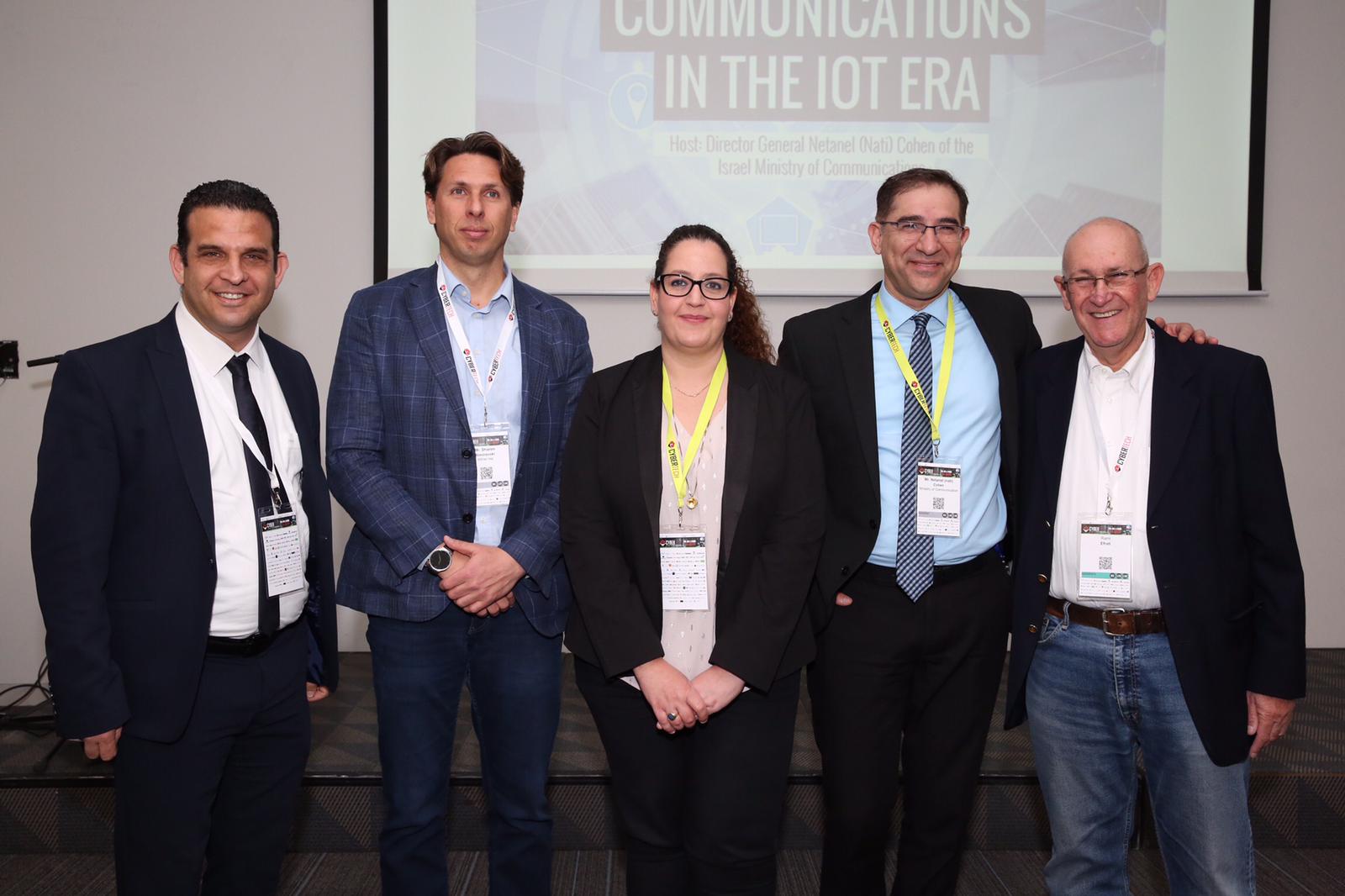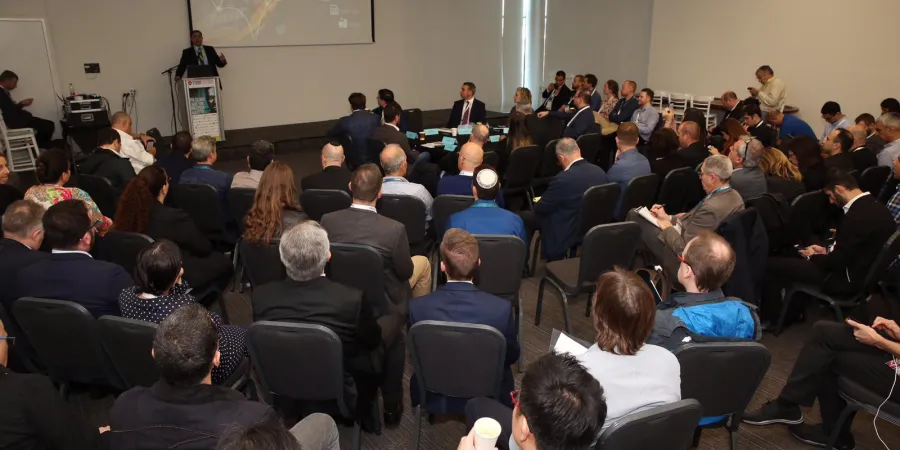Cybertech 2019: Communications in the IoT Era
During the third day of Cybertech 2019, visitors from Israel and around the world assembled for a special round table discussion of communication in the IoT era, which was led by Brig. Gen. (res.) Netanel (Nati) Cohen, Director General of the Israel Ministry of Communications
Dan Arkin
| 31/01/2019
Installation of optical fiber networks, smart cities, regulation for the era of the fifth generation of communications, new, pro-active approaches advocating preemptive action against cyber attackers and being smarter than the "bad guys" – these were among the principles and recommendations made at the round table discussion devoted to communication in the IoT era at Cybertech 2019.
Nati Cohen, Director General of the Israel Ministry of Communications, reported that within a few years, Israel will have a nation-wide optical fiber network, fifth-generation cellular communication infrastructure and cloud computing services for the cellular systems. In the coming years, the IoT category will include not just home appliances, but autonomous cars, agricultural equipment and state-of-the-art systems serving smart cities, as well as health and education systems. All of those elements will be a part of the IoT category.
Alexandru Petrescu, Romanian Minister of Communication, reported that Romania is currently serving as President of the European Council, and its representatives will endeavor, within the European Union, to establish a "digital supermarket" that would include the enactment of European standards for fighting cyberattacks against the IoT and the threats that apply specifically to this category.
George Michaelides, Commissioner of Communications in the Government of Cyprus, reported that 25% of cyberattacks damage IoT products and that in preparation for fifth-generation communication equipment, government regulation is required in order to cope with this challenge. He noted, however, that regulation and restrictive rules must not be exaggerated, as otherwise, the IoT products will become too costly.
Col. (res.) Dr. Gabi Siboni of the G. Bina Company said that every government organ, every government ministry, must assume responsibility for cybersecurity within its respective sector. Beyond the responsibility of every government agency, however, a "Magna Carta of Cybersecurity Responsibility" should be drafted – a document setting forth guidelines, determining who is in charge of what and how the operations of the various government ministries, offices and organizations should be coordinated. The regulation should extend to all activities and gain consensus from everyone involved.
Tali Shemer from the Israel National Cyber Directorate: "What is the essence of the threat? In the era of the fifth generation, everything will be interconnected. In the not too distant future, street lights in every city will contain sensors – and that will make them vulnerable to cyber threats and malware. It is very important to develop awareness of these threats. We at the INCD encourage the development of defensive capabilities."

Oren Sagi, General Manager of Cisco Israel, said: "In the future, 20 billion machines will communicate with one another – M2M. There will be massive amounts of data and communication. One of the solutions is Multi Cloud. How do we protect vital infrastructures? We need to establish a cybersecurity platform. The entire system will be like one giant sensor capable of identifying irregular behavior patterns. Naturally, this calls for cybersecurity intelligence."
Sharon Nimirovski, CEO of the White Hat Company, said: "The number of cyberattacks is increasing for reasons having to do with money and politics. This criminal activity may turn out to be rewarding. It is a dynamic world, so the attacker is dynamic and the defending side must be dynamic and pro-active as well, just like the attacker. We need a dynamic approach, just like the one the 'bad guys' have."
Uri Shine, Head of Emergency Preparations at the Israel Ministry of Energy, reminded the participants of the fact that the private production of electricity is expanding, and this matter must be considered, as this activity might come under attack. The Ministry is cooperating with the National CERT in Be’er-Sheva to provide guidance to elements from the private sector.
Liora Shechter, CIO at Tel-Aviv Municipality, represented the Tel-Aviv Smart City Project and reported that the project has already been connected to the municipal sewage system, bicycle rental stations and parking lots. One thousand surveillance cameras are in operation throughout the city and this number will be doubled. 200 kilometers of optical fibers were deployed around the city.
During the third day of Cybertech 2019, visitors from Israel and around the world assembled for a special round table discussion of communication in the IoT era, which was led by Brig. Gen. (res.) Netanel (Nati) Cohen, Director General of the Israel Ministry of Communications
Installation of optical fiber networks, smart cities, regulation for the era of the fifth generation of communications, new, pro-active approaches advocating preemptive action against cyber attackers and being smarter than the "bad guys" – these were among the principles and recommendations made at the round table discussion devoted to communication in the IoT era at Cybertech 2019.
Nati Cohen, Director General of the Israel Ministry of Communications, reported that within a few years, Israel will have a nation-wide optical fiber network, fifth-generation cellular communication infrastructure and cloud computing services for the cellular systems. In the coming years, the IoT category will include not just home appliances, but autonomous cars, agricultural equipment and state-of-the-art systems serving smart cities, as well as health and education systems. All of those elements will be a part of the IoT category.
Alexandru Petrescu, Romanian Minister of Communication, reported that Romania is currently serving as President of the European Council, and its representatives will endeavor, within the European Union, to establish a "digital supermarket" that would include the enactment of European standards for fighting cyberattacks against the IoT and the threats that apply specifically to this category.
George Michaelides, Commissioner of Communications in the Government of Cyprus, reported that 25% of cyberattacks damage IoT products and that in preparation for fifth-generation communication equipment, government regulation is required in order to cope with this challenge. He noted, however, that regulation and restrictive rules must not be exaggerated, as otherwise, the IoT products will become too costly.
Col. (res.) Dr. Gabi Siboni of the G. Bina Company said that every government organ, every government ministry, must assume responsibility for cybersecurity within its respective sector. Beyond the responsibility of every government agency, however, a "Magna Carta of Cybersecurity Responsibility" should be drafted – a document setting forth guidelines, determining who is in charge of what and how the operations of the various government ministries, offices and organizations should be coordinated. The regulation should extend to all activities and gain consensus from everyone involved.
Tali Shemer from the Israel National Cyber Directorate: "What is the essence of the threat? In the era of the fifth generation, everything will be interconnected. In the not too distant future, street lights in every city will contain sensors – and that will make them vulnerable to cyber threats and malware. It is very important to develop awareness of these threats. We at the INCD encourage the development of defensive capabilities."

Oren Sagi, General Manager of Cisco Israel, said: "In the future, 20 billion machines will communicate with one another – M2M. There will be massive amounts of data and communication. One of the solutions is Multi Cloud. How do we protect vital infrastructures? We need to establish a cybersecurity platform. The entire system will be like one giant sensor capable of identifying irregular behavior patterns. Naturally, this calls for cybersecurity intelligence."
Sharon Nimirovski, CEO of the White Hat Company, said: "The number of cyberattacks is increasing for reasons having to do with money and politics. This criminal activity may turn out to be rewarding. It is a dynamic world, so the attacker is dynamic and the defending side must be dynamic and pro-active as well, just like the attacker. We need a dynamic approach, just like the one the 'bad guys' have."
Uri Shine, Head of Emergency Preparations at the Israel Ministry of Energy, reminded the participants of the fact that the private production of electricity is expanding, and this matter must be considered, as this activity might come under attack. The Ministry is cooperating with the National CERT in Be’er-Sheva to provide guidance to elements from the private sector.
Liora Shechter, CIO at Tel-Aviv Municipality, represented the Tel-Aviv Smart City Project and reported that the project has already been connected to the municipal sewage system, bicycle rental stations and parking lots. One thousand surveillance cameras are in operation throughout the city and this number will be doubled. 200 kilometers of optical fibers were deployed around the city.



